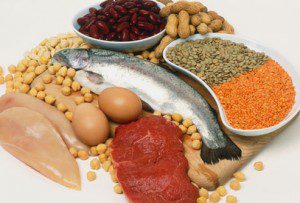
The Institute of Medicine of the National Academy of Sciences has concluded that our daily protein requirements should be 10% to 35% of our total caloric intake, with men needing slightly more than women.
A lack of protein can cause loss of muscle mass, decreased immunity, a slow milk supply in breastfeeding mums as well as weakening of the heart and respiratory system.
In successful and long term weight loss your intake of protein is key. Protein helps build lean muscles, contains the 22 amino acids which are the building blocks of life and helps us stay fuller for longer but the type of protein we eat can hamper our weight loss. If we eat too much fatty types of protein like red meats – which are high in saturated fat – or full fat cheeses then the source of our protein is accompanied by high levels of fat which our body then stores.
The widespread popularity of high protein diets is due in large part to their ability to help manage hunger. When protein is absorbed, it sends a signal to the brain to decrease your hunger. Another benefit of protein is that it raises your resting metabolism by maintaining muscle mass. As we age, muscle mass decreases without exercise, so staying fit is a key to burning fat by keeping your metabolism high. Protein also leads to a much less rapid rise and fall of blood sugar and insulin, so you avoid the “sugar highs and lows” after eating sweets without adequate protein.
You can obtain healthy sources of protein without high levels of saturated fat. For example, soybeans, nuts and whole grains provide protein without much saturated fat and offer plenty of healthful fibre and micronutrients as well.
Simple points to follow:
1. Eat breakfast like a King, midday like a Queen and evening like a Pauper and make sure each meal has enough protein in
- Natural rhythm of body is to digest and assimilate food far more efficiently at midday
- Eat 75% of your calories for the day by 4pm in afternoon
- Eat a small evening meal or divide it into 2 smaller portions
- Don’t eat 2 hours before going to bed
2. Snack little and often with high protein and low saturated fat foods
- A large meal will cause elevated levels of insulin just like eating starch
- Little and often’ sends the body the right signal–there is plenty of food so you can burn fat
- Keep your blood sugar at even levels–no mood swings or extreme hunger Keep hormone levels even
For more information on how much protein you need each day click here
